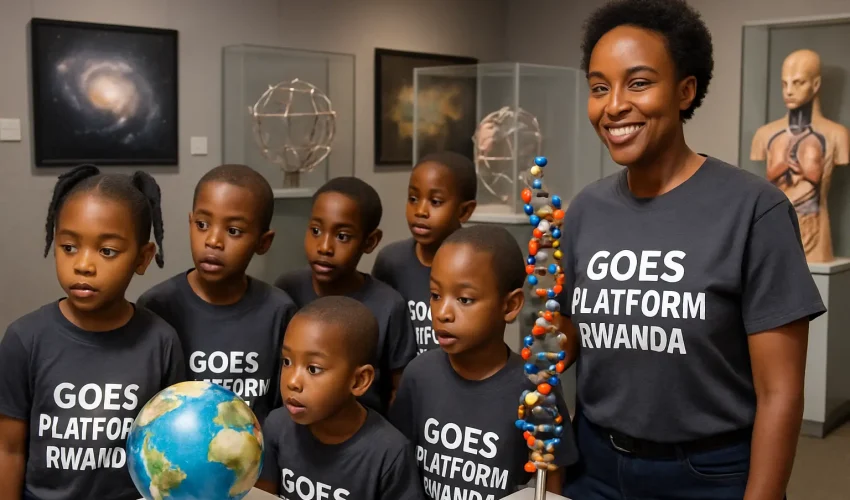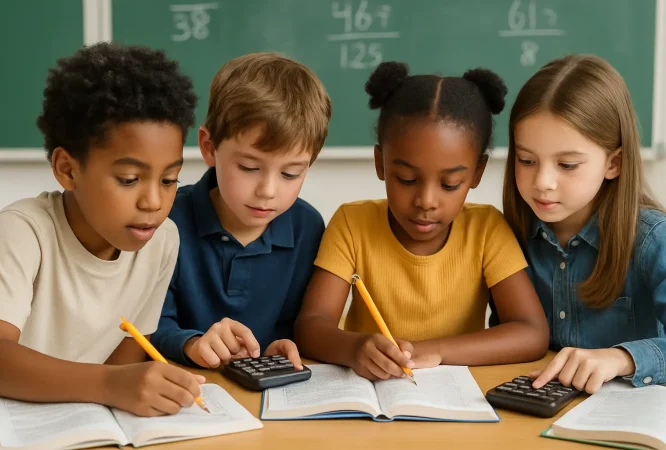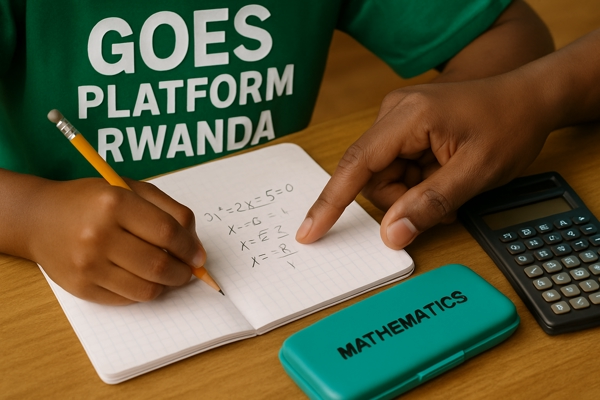P5 Science and Elementary Technology (SET)

Get unlimited access to all learning content and premium assets Membership Pro
⚗️🌱🛠️ P5 Science and Elementary Technology (SET) Courses
Welcome to the Primary 5 Science and Elementary Technology Program!
This course empowers learners to explore the wonders of living and non-living things, energy, matter, health, environment, and basic technology skills. Students build a deeper connection with the natural world while sharpening problem-solving and innovation abilities through hands-on activities.
By blending scientific discovery with practical technology, this course prepares learners for higher levels of study and real-life application of knowledge.
📘 What Learners Will Explore:
- The human body, nutrition, and personal health
- Plants, animals, and their environments
- Energy sources, uses, and conservation
- Matter, materials, and their properties
- Simple machines and basic technological skills
- Environmental care and sustainability practices
- Creative projects in science and technology
🧠 The 4Cs in Action:
- Critical Thinking: Investigating scientific problems and testing solutions.
- Creativity: Designing simple tools, models, and eco-projects.
- Communication: Sharing findings through drawings, presentations, and group work.
- Collaboration: Working in teams to carry out experiments and build projects.
- 14 Sections
- 104 Lessons
- 10 Weeks
- Unit 1: Carpentry ToolsIn this unit, you will learn about different carpentry tools used for cutting, joining, and shaping wood. You will study their uses, how to handle them safely, and how to take care of them. You will also understand the importance of carpentry in making and repairing wooden objects.6
- Unit 3: LightHere, you will explore tools used in building and construction work. You will learn how masons use these tools to mix materials, lay bricks, and make strong structures. You will also learn how to maintain masonry tools and practice safety while using them.6
- Unit 3: LightIn this unit, you will study the nature of light and how it helps us to see. You will learn about sources of light, reflection, and shadows. You will also discover how light travels and its importance in daily life.6
- Unit 4: Computer Memories and StoragesHere, you will learn about how computers store information. You will study different types of memory and storage devices such as hard disks, flash drives, and memory cards. You will also understand how to save, retrieve, and protect your data.6
- Unit 5: Writing SkillsIn this unit, you will practice how to type and edit text on a computer. You will learn how to change fonts, use formatting tools, and save your work properly. These skills will help you improve your schoolwork and communication.5
- Unit 6: Computer ResearchHere, you will discover how to use the internet to find information. You will learn about search engines, keywords, and how to collect reliable data online. You will also understand how to use computer research responsibly.8
- Unit 7: Programming for ChildrenIn this unit, you will continue learning how to create simple programs using Scratch and Turtle Art. You will design drawings, animations, and games by giving clear instructions to the computer. This will help you develop logical thinking and creativity.7
- 7.1Lesson 1: Introduction to Programming for Children
- 7.2Lesson 2: Performing Arithmetic Operations in Turtle Art
- 7.3Lesson 4: Using Paint Editor in Scratch
- 7.4Lesson 3: Drawing Complex Shapes in Turtle Art
- 7.5Lesson 5: Using Sound and Music in Scratch Projects
- 7.6Lesson 6: Programming a Robot
- 7.7Lesson 7: Review & End of Unit Assessment
- Unit 8: Water PollutionHere, you will study how water becomes polluted and the effects of pollution on people, animals, and plants. You will learn about the main causes of water pollution and simple ways to keep water sources clean. You will also understand why clean water is important for life.14
- 8.1Lesson 1: Introduction to Water Pollution
- 8.2Lesson 2: Importance of Water
- 8.3Lesson 3: Sources of Water
- 8.4Lesson 4: Properties of Water
- 8.5Lesson 5: Simple Water Cycle and Rainwater
- 8.6Lesson 6: Effects of Rainwater
- 8.7Lesson 7: Protecting the Environment from Negative Effects of Rainwater
- 8.8Lesson 8: Water Pollutants
- 8.9Lesson 9: Dangers of Water Pollution
- 8.10Lesson 11: Water Purification Methods
- 8.11Lesson 12: Making a Water Filter
- 8.12Lesson 13: Water Storage
- 8.13Lesson 14: Review & End of Unit Assessment
- 8.14Lesson 10: Prevention of Water Pollution
- Unit 9: Soil and CultivationIn this unit, you will explore how soil supports the growth of crops. You will learn about soil preparation, planting, and caring for crops. You will also discover good farming practices that help maintain soil fertility.6
- Unit 10: Plants and EnvironmentHere, you will study the relationship between plants and their environment. You will learn how plants grow, their importance to living things, and how to care for them. You will also understand how protecting plants helps conserve the environment.7
- 10.1Lesson 1: Introduction to Plants and Environment
- 10.2Lesson 3: Importance of Trees to the Environment
- 10.3Lesson 4: Afforestation and Deforestation
- 10.4Lesson 2: Importance of Plants
- 10.5Lesson 6: Prevention of Deforestation
- 10.6Lesson 7: Review & End of Unit Assessment
- 10.7Lesson 5: Effects of Deforestation
- Unit 11: Human Digestive SystemIn this unit, you will learn about the parts of the digestive system and their functions. You will study how food is digested and absorbed into the body. You will also discover the importance of eating healthy foods and maintaining good hygiene.8
- 11.1Lesson 1: Introduction to the Human Digestive System
- 11.2Lesson 2: Parts and Functions of the Digestive System
- 11.3Lesson 3: Stages of Digestion
- 11.4Lesson 4: Hygiene of Digestion
- 11.5Lesson 6: Preparation of a Balanced Diet
- 11.6Lesson 5: Balanced Diet
- 11.7Lesson 7: Nutrition and Prevention of Deficiency Diseases
- 11.8Lesson 8: Review & End of Unit Assessment
- Unit 12: Human DiseasesHere, you will learn about common human diseases, their causes, and how they spread. You will study ways to prevent diseases and the importance of cleanliness and vaccination. You will also understand how good habits keep your body healthy.5
- Unit 13: ElectricityIn this unit, you will study sources of electricity and how electrical circuits work. You will learn about conductors, insulators, and safety measures when using electricity. You will also explore how electricity is used in homes and schools.8
- 13.1Lesson 1: Introduction to Electricity
- 13.2Lesson 2: Importance of Electricity
- 13.3Lesson 3: Production of Electricity
- 13.4Lesson 4: Tools and Materials Used in Electrical Work
- 13.5Lesson 5: Constructing Simple Electric Circuits
- 13.6Lesson 6: Controlling Simple Electric Circuits
- 13.7Lesson 7: Dangers of Electricity
- 13.8Lesson 8: Review & End of Unit Assessment
- Unit 14: Materials and States of MatterHere, you will learn about different materials and their properties. You will study the three main states of matter—solid, liquid, and gas—and how they change from one state to another. You will also explore how materials are used in everyday life.12
- 14.1Lesson 1: Introduction to Materials and States of Matter
- 14.2Lesson 5: Maintenance of Metals
- 14.3Lesson 4: Uses of Common Metals
- 14.4Lesson 3: Physical Properties of Metals
- 14.5Lesson 2: Classification of Materials
- 14.6Lesson 6: Density and Relative Density
- 14.7Lesson 7: Matter and Its States
- 14.8Lesson 8: Properties of the Three States of Matter
- 14.9Lesson 9: Change of State in Water
- 14.10Lesson 10: Changes in the Water Cycle
- 14.11Lesson 11: Transformation of States of Matter
- 14.12Lesson 12: Review & End of Unit Assessment
Get unlimited access to all learning content and premium assets Membership Pro
"I enjoyed learning in P5 SET because it was both fun and practical. I learned how plants grow, how to save energy, and even how to make small models. It made me love science and technology!" — P5 Student
You might be interested in
-
All levels
-
2 Students
-
39 Lessons



